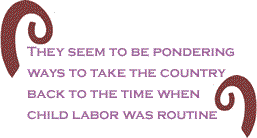Picture
the breaker boys, rank on rank in the coal fields, sitting
all day in the cold and the unrelenting coal dust, using
their bare hands to sort through the coal to take out the
slate and anything that would detract from the profits of
the coal companies.
 Slate
is sharp and it cut their fingers and hands and they worked
in the cold and they breathed in the dust and, often, they
lost fingers and other parts in the inexorably turning wheels
of the coal industry. On occasion, according to reports
of the social workers at the time, a boy would be caught
up in the machinery, but his body would not be removed until
the end of the day when the machines stopped. Slate
is sharp and it cut their fingers and hands and they worked
in the cold and they breathed in the dust and, often, they
lost fingers and other parts in the inexorably turning wheels
of the coal industry. On occasion, according to reports
of the social workers at the time, a boy would be caught
up in the machinery, but his body would not be removed until
the end of the day when the machines stopped.
Every
minute of every day, exposed to this kind of treatment,
the boys knew the value of their lives to the society into
which they had been born. They were 10 or 12 or 14 years
old, but they were old beyond their years. Many of them
smoked, no doubt many of them drank, and one 14-year-old
told Lewis Hine, the famed photographer of working Americans
and child laborers, that he regularly frequented brothels.
Such
was the world of working children. It wasn�t just the breaker
boys, but it was children in every conceivable occupation
in America
at the time. To be sure, they were not the children of the
moneyed class. They were mostly the children of immigrants
who came from many countries where they had lived in poverty
and were seeking a better life. Here, they and their children
worked in textile mills, glass factories, lumberyards, mines,
and farms, doing everything that any farmer would do except
make a decent wage.
Perhaps,
some of the worst conditions were in �homework,� in which
immigrants took home textile work and continued their day�s
work in their cramped tenements until late at night. At
a time when children should have been sleeping, they, too,
were working on the garments. The airless, often cold apartments
were breeding grounds for diseases such as tuberculosis.
The child workers suffered along with the parents.
All
of the children worked for pennies a day. That�s why the
industrial magnates hired them�they worked cheaper than
their parents, no matter what the job. They contributed
mightily to the economy of their new country and they never
received a fair wage, or even the acknowledgement that they
had made vital contributions to their fellow Americans.
 The
country was still reeling from the after effects of the
Civil War and the purported end of slavery, but former slaves
for a long, long time were treated little differently than
they were in bondage. The child laborers were treated similarly
and, in fact, their condition was sometimes referred to
as �child slavery.� The
country was still reeling from the after effects of the
Civil War and the purported end of slavery, but former slaves
for a long, long time were treated little differently than
they were in bondage. The child laborers were treated similarly
and, in fact, their condition was sometimes referred to
as �child slavery.�
The
country�s child labor laws were passed in the early part
of the 20th Century and they were challenged immediately
by the Robber Barons and others who owned the machinery
of industry. The first few attempts to regulate child labor,
starting in about 1916, were declared unconstitutional.
It took until 1938 with the Fair Labor Standards Act to
protect children from the brutal exploitation of American
industry. The FLSA withstood a court challenge in 1941 and,
since then, many forms of child labor have been outlawed.
In
the first half of the last century, the worst kinds of child
labor practices were eliminated, including the six-day week,
10 hours a day, with, perhaps, only eight hours on Saturday.
It was pretty much the same as for their elders.
Yet,
today�s Robber Barons, the captains of Corporate America,
can�t quite accept the interference of the government in
such things as labor standards or labor laws, which set
limits to how they can use and abuse workers. Their minions
in politics have set out to weaken or destroy protections
for workers, so we have the spectacle of the Republican
governor of Wisconsin eliminating collective
bargaining for most public workers in the Badger State. Other
Republicans are doing the same, or attempting to do the
same, in other states.
It
is ironic that Lewis Hine, probably the foremost photographic
chronicler of American workers in U.S. history, was born in Oshkosh, Wis., in 1874, about two years before
the first stirring of American revulsion over the condition
of child workers. That revulsion turned into a movement,
led by unions, resulting in the formation of the National
Child Labor Committee in 1904 in New
York City. New England unions had condemned
child labor as early as 1832.

Now
that Republicans and their Tea Party wing and other right
wingers have made their move to destroy collective bargaining
for American workers, they seem to be pondering ways to
take the country back to the time when child labor was routine
and the boys and girls of the working class were not allowed
to enjoy a childhood or an education.
U.S.
Senator Mike Lee, R-Utah, reportedly a constitutional lawyer,
newly sworn in after his election last fall, recently pronounced
federal child labor laws �unconstitutional.� That, he said,
should be up to the states to decide. He must know that
the 1941 decision on the constitutionality of the FLSA (which
included limits on the employment of children) is settled
law, so what he is implicitly saying is that we should return
to an earlier time, when states could decide whether children
could be used. Of course, he may have just been throwing
a bit of raw meat to his fellow Tea Partiers when he made
the comment. It�s the kind of thing they like to hear and
he delivered.
Lee
is young, so he may not remember a time much earlier than
the disco era of the 1970s. Along the way, he should have
read and studied about the condition of the country when
some vital issues were largely left to the states to decide.
He might be too young to recall states� rights and what
it meant for African-Americans. It took a monumental effort
to overcome the drag that was placed on civil rights by
that fight over �states� rights,� but civil rights were
gained after a very long and bloody struggle.
 Overall,
though, he is just another in a long line of Tea Party Republicans
who want to �take the country back.� That is, take it back
to another time, when the working class and minorities and
their children knew their place, which was providing profits
for those with the power. Overall,
though, he is just another in a long line of Tea Party Republicans
who want to �take the country back.� That is, take it back
to another time, when the working class and minorities and
their children knew their place, which was providing profits
for those with the power.
Today,
you will not see pictures of breaker boys or cotton mill
girls at work in this country, but, if there were a Lewis
Hine at work in scores of other countries, you would see
the similar pictures of children, hard at work this very
day, giving up their lives to commerce and being compensated
very little, if at all.
Lee
knows that it isn�t likely that child labor laws will be
rescinded in this country, so his statement to a Tea Party
gathering simply is a demonstration of his cynical view
of child protecting laws. Corporate America has accomplished what Lee appears to favor:
child labor. In our globalized economy, transnational corporations
have taken millions of children back to the days of the
breaker boys and the girls in the textile mills. It�s just
that now, the child workers are of another nationality and,
in today�s high-tech world, the children are exposed to
the added dangers and toxic elements of the production of
electronic devices, which run the world.
Whether
child labor laws are constitutional or unconstitutional
can be debated any day of the week, but Republicans and
the Tea Partiers have to answer just one question: What
about the child workers and what about common decency?
BlackCommentator.com
Columnist, John Funiciello, is a labor organizer and former
union organizer. His union work started when he became a
local president of The Newspaper Guild in the early 1970s.
He was a reporter for 14 years for newspapers in New York State. In
addition to labor work, he is organizing family farmers
as they struggle to stay on the land under enormous pressure
from factory food producers and land developers. Click here
to contact Mr. Funiciello.

|

